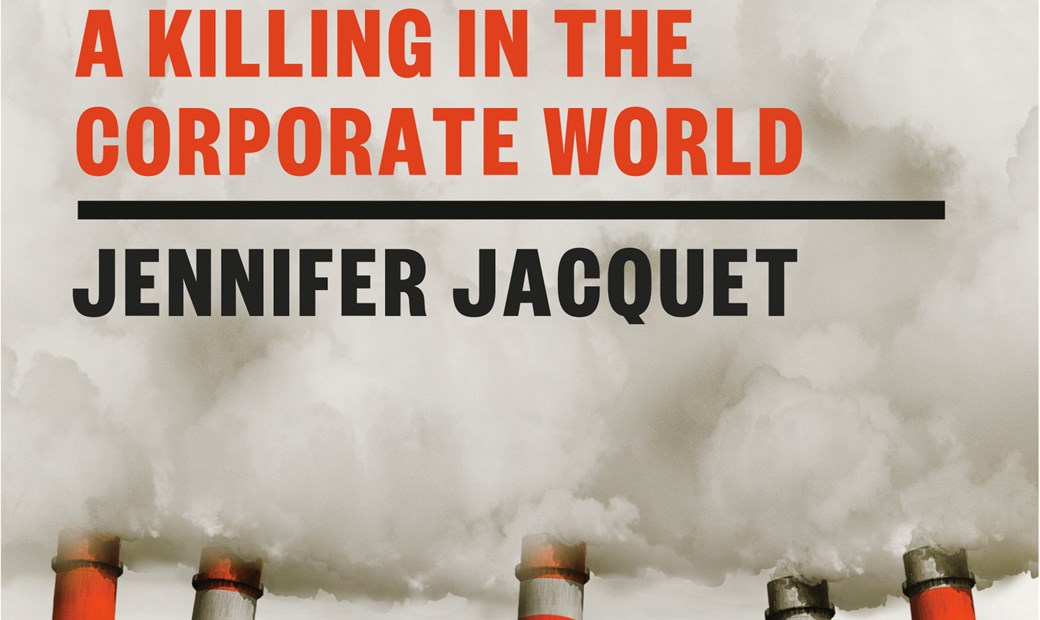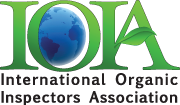The Science-Denial Playbook - interview
In The Playbook: How to deny science, sell lies and make a killing in the corporate world, Jennifer Jacquet, an associate professor in New York University’s Department of Environmental Studies, maps out how companies respond to a major threat to their operations — scientific evidence.

In The Playbook: How to deny science, sell lies and make a killing in the corporate world, Jennifer Jacquet, an associate professor in New York University’s Department of Environmental Studies, maps out how companies respond to a major threat to their operations — scientific evidence. Readers are likely familiar with how the tobacco industry denied evidence of smoking’s harms for many profitable decades, and, more recently, how the fossil fuel industry suppressed, then denied, the scientific evidence of its products' central role in climate change. Here Jacquet demonstrates that scientific denial is industry agnostic — that is, a corporation can use the same toolkit to attack virtually any threat, whether it’s evidence that links red meat to colon cancer, that neonicotinoid pesticides harm bees, or that asbestos damages lungs.
This strategy, broadly speaking, can be broken into four, often sequential, steps: Challenge the problem — that is, deny that it exists. Challenge causation — acknowledge that there is a problem but deny that your product causes it. Challenge the messenger — discredit scientists and whistleblowers by calling them biased, alarmist or crazy. And if all that fails, challenge the policy — propose voluntary measures and fight regulations.
The rise of the internet and social media have made it easier than ever for companies — and the trade associations, hired experts and PR firms that help spread their message and attack their critics — to buy ads, create “astroturf” groups, and speak directly to the public on Twitter and Facebook, without ever disclosing conflicts of interest. Using these tactics, corporations can delay regulations for decades or even generations — earning billions in profits — even if scientific consensus and laws do eventually coalesce. By denying science, corporations create an environment that Jacquet likens to a casino, “with its calculated architecture and design — the dimmed chandeliers, the comfortable furniture, the dealers, the drinks — to keep the people inside comfortable and gambling as long as possible.”
I spoke with Jacquet via Zoom; this interview has been edited for length and clarity.
Can you lay out how and why corporations deny scientific evidence?
It starts in the early 20th century with worker safety issues — you see the asbestos, radium, and lead industries all begin to challenge the science about the link between their products and worker health problems. And then there is a second wave of denial that happens when we start to see linkages between the consumption of certain products and harms to human health; the tobacco industry was the most visible, but it was also happening with pharmaceuticals and food. And then there is the more recent wave of environmental issues and, of course, the denial of climate change by fossil fuel companies.
The central claim to the book is that scientific denial — challenging scientific knowledge — is just part of business operations. It really isn't given much more moral consideration by any company beyond that. So I think you would find similar arguments being made within companies about things like tax havens or the minimum wage. However you feel about these things as an employee, the company has a particular stance, which is that we have to challenge science that challenges our product because we have to maximize revenue.
How do you see the food and agriculture industries using these strategies right now?
As Marion Nestle has written, conflicts of interest are very common in nutrition research — companies are so thoroughly involved in nutrition science that it’s almost an arm of industry. And one area that I have more expertise in is the role that large meat and dairy companies play in the denial of climate change. Initially, these industries didn’t focus as much on denying the existence of climate change as the fossil fuel industry did. But they challenged the extent to which their products cause it. And that's a big part of the playbook: if you can't challenge the problem itself, challenge its causes. So they say, "You know, it really isn't meat and dairy. The transportation sector is really much more important." More recently, though, the meat and dairy industry has actually begun challenging whether or not climate change is human-caused. This, to me, suggests that they're really going whole hog into this issue. If you're at that level of denial, that typically means you have a lot of resources behind you, because at this point the science is very well established — it's a bold stance.
There's a lot of conversation right now trying to parse how meat consumption affects the climate. Do we have to stop eating beef, or are there ways that we can produce beef that are more responsible and climate-friendly? Can we feed seaweed to cows or do regenerative ranching? To what extent is the meat industry driving that narrative?
They are 100 percent behind this narrative. They are fundamentally shaping the narrative, and the conversations around kelp and regenerative ag are great examples. And it’s only going to get more intense because there is more and more scientific attention on the issue of meat and dairy and climate change. They are responding with really big investments at the university level and are helping pump out research that argues that the meat and dairy industries don't have to change all that much to be a sustainable part of the solution. The industry has also put an enormous amount of money into Facebook ads, and Twitter, in order to control the conversation and to make people think, well, it must not be too bad.
The meat industry loves to talk about how the environmental footprint of beef has decreased over the last 50 years. And they want us, in a way, to stay focused on climate, because they can more easily control that narrative. Because once people start talking across a suite of issues — whether it's climate change, water and land use, the impacts of the industry on wild animals and the impacts on the farmed animals themselves — then they really are in a corner. The reason why the environmental footprint of beef has decreased is because of intensification, which has led to far worse outcomes on a range of issues.
You write about how effective it is for the industry to fund researchers and scientific experts to make their case to the public, which of course creates conflicts of interest. But you also describe how the idea of a conflict of interest was turned on its head and used to try to discredit the EAT-Lancet Commission, a team of researchers studying how we can feed 10 billion people without destroying the planet.
Yes, this strategy felt very 21st century to me. Previously, industry would try to discredit scientists and medical doctors by calling them publicity hounds and saying they were doom and gloom. But this use of the idea of a conflict of interest is only possible now because the conversation around conflicts of interest has really blown up in recent years due to industry involvement in academia. So now the public is aware that a conflict of interest is a bad thing. But people are still sort of hazy on what a conflict of interest really is — and industry is certainly using that to its advantage. A conflict of interest is fundamentally financial in nature — if you're receiving money from an industry, your views will likely be influenced by that monetary arrangement. But with the EAT-Lancet report, the industry said that these two authors are vegetarians or vegans, and — as a result of that dietary choice —they have a conflict of interest. Which is wild to me, but it must have some resonance with the public because the industry uses it over and over again. It’s such a weak argument because that would imply that every other study about meat and dairy that was written by meat eaters represented a conflict of interest. But that is not how people see it, because meat eating is the norm.
Undermining science might pay off for industry in the short term, but the coronavirus pandemic has shown just how damaging this can be in the long term — eroding the public’s trust broadly in medicine, public health and in experts.
In a way, the book is dedicated to science. And science has its problems, of course — every form of knowledge has its problems. But to me, it's the best form of knowledge. It really is remarkable what science can achieve. But as philosopher of science Thomas Kuhn says, there's no guarantee that science has to last. It takes very special conditions, he says, to provide a foundation on which science can operate. And if we don't protect those conditions, we're going to lose science as a way of knowing. That really would be a giant loss to civilization. And I don't mean to sound dramatic, but it really feels to me like this assault on science that the corporation involves itself in whenever there's a threat, plays an enormous role in that dismantling.
